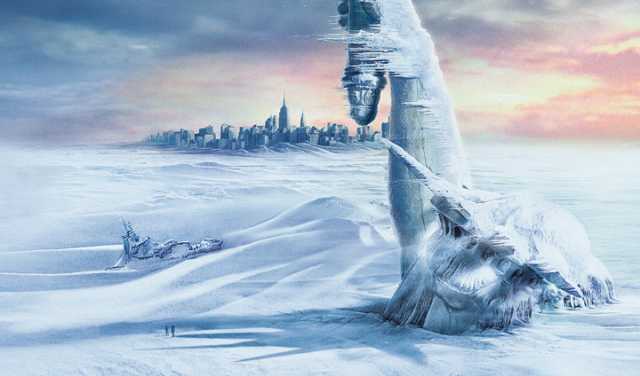 WINTER IS COMING: EARTH APPROACHING 'MINI ICE AGE' IN 15 YEARS, SOLAR CYCLE STUDY
WINTER IS COMING: EARTH APPROACHING 'MINI ICE AGE' IN 15 YEARS, SOLAR CYCLE STUDY
Posted by Lukas Magnuson
Earth is facing the prospect of a 'mini ice age' this century, with our sun's activity projected to fall 60 percent in the 2030s, British astrophysicists say, based on the results of new research that they claim allows exact predictions of solar cycles.
Our planet is just 15 years from a new 'mini ice age' that could cause extremely cold winters characterized by the freezing of normally ice-free rivers as well as by year-round snow fields in areas that have never witnessed such climate conditions before, a group of astrophysicists claim.
The scientists could draw such a conclusion based on a new model of the sun's activity that reportedly enables the researchers to make "extremely accurate predictions" of changes in solar activity.
Although, the fact that the sun's activity varies within a 10-12 year long cycles was first discovered almost two centuries ago, in 1843, all the previously existing explanatory models failed to fully explain the fluctuations with each cycle as well as between the cycles.
Until now, the astrophysicists thought that the variations of the solar activity depended on the dynamo caused by convecting fluid deep inside the sun.
The latest study conducted by a research team from Northumbria University, Newcastle upon Tyne, UK, and led by Professor Valentina Zharkova demonstrated that the variations in the Sun's activity are caused by two dynamo processes - one deep in the convection zone of the sun and one near its surface.
The research team analyzed three solar activity cycles that cover the period from 1976 to 2008 studying magnetic field activity of the sun during this time by using a technique called principal component analysis of the magnetic field observations from the Wilcox Solar Observatory in California.
The scientists discovered magnetic waves in two different layers of the Solar interior that "fluctuate between the northern and southern hemispheres of the Sun."
"We found magnetic wave components appearing in pairs, originating in two different layers in the Sun's interior. They both have a frequency of approximately 11 years, although this frequency is slightly different, and they are offset in time," said Professor Zharkova.
Later, they also compared their findings concerning the intensity of the Sun's activity with each year's data on the average number of sunspots - a strong indicator of solar activity.
As a result, the team managed to create a very accurate model of predicting the solar activity fluctuations.
"Combining both waves together and comparing to real data for the current solar cycle, we found that our predictions showed an accuracy of 97 percent," said Zharkova.
The study findings were presented at the National Astronomy Meeting in Llandudno on July 9 and published in the Royal Astronomical Society papers.
The model demonstrates that solar activity will fall by 60 percent by 2030 as the magnetic waves inside the Sun will become increasingly more desynchronized during the next two cycles, especially during cycle 26, which covers the decade between 2030 and 2040.
"In cycle 26, the two waves exactly mirror each other - peaking at the same time but in opposite hemispheres of the Sun. Their interaction will be disruptive, or they will nearly cancel each other," Professor Zharkova said.
"Effectively, when the waves are approximately in phase, they can show strong interaction, or resonance, and we have strong solar activity. When they are out of phase, we have solar minimums. When there is full phase separation, we have the conditions last seen during the Maunder minimum, 370 years ago," she added.
The Maunder minimum is a name of a period between 1645 and 1715 characterized by prolonged low solar activity as well as by extremely cold winters in Europe and North America as it also correlates with a climatic period between 1550 and 1850 called the 'Little Ice Age.'
Ice Ages start and end so suddenly, "it's like a button was pressed," say scientists
'Forget global warming, prepare for Ice Age'
Hi! I am a robot. I just upvoted you! I found similar content that readers might be interested in:
https://www.rt.com/news/273169-solar-cycle-ice-age/
Downvoting a post can decrease pending rewards and make it less visible. Common reasons:
Submit
Glad to see someone trying to get the message out.
Downvoting a post can decrease pending rewards and make it less visible. Common reasons:
Submit
Congratulations @creelmandesigns! You have received a personal award!
Click on the badge to view your own Board of Honor on SteemitBoard.
Downvoting a post can decrease pending rewards and make it less visible. Common reasons:
Submit
Congratulations @creelmandesigns! You received a personal award!
You can view your badges on your Steem Board and compare to others on the Steem Ranking
Do not miss the last post from @steemitboard:
Vote for @Steemitboard as a witness to get one more award and increased upvotes!
Downvoting a post can decrease pending rewards and make it less visible. Common reasons:
Submit